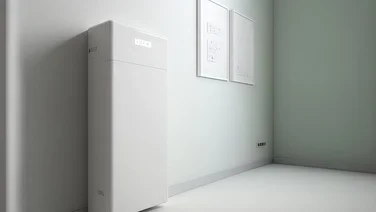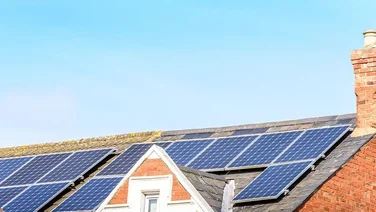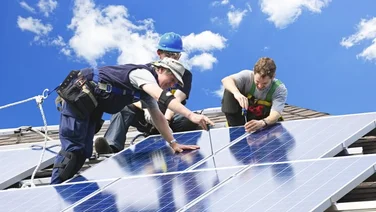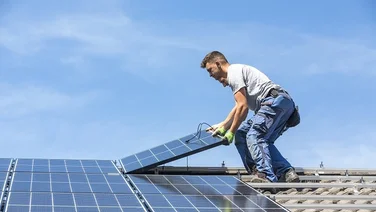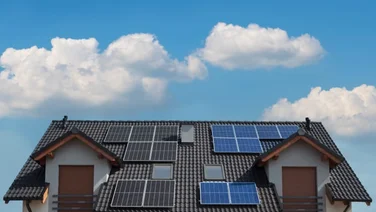We receive a small fee from trusted installers when you request a quote through our site. This helps us keep our content independent, well-researched and up to date – Learn more
- Solar batteries cost about £4,500 on average
- A solar battery will typically last you 10–15 years
- Without a battery, you could lose around 50% of the power your panels produce

Solar energy is booming in the UK, with over 1.3 million households using solar panels to cut their bills, lower emissions, and gain more control over their energy use. As prices fall and technology improves, more people are looking to maximise their solar investment.
That’s where solar batteries come in. Solar batteries let you store and use more of the energy your panels produce, instead of sending it back to the grid. By adding a battery, you can significantly boost your savings, reduce your reliance on rising electricity prices, and make the most of every ray of sunlight.
If you’re already set on getting a solar PV system with a solar battery, why not fill in our web form to receive free quotes from trusted installers?
Which solar products are you interested in?
Get startedIs a solar battery worth it?
Yes Solar batteries are worth it in the long run, especially if you’re thinking beyond just short-term savings.
While the upfront cost can be significant (a typical battery for a three-bedroom home costs between £2,500 and £4,000, in addition to your solar panel system), the long-term value they deliver is substantial.
By storing excess solar energy for use later, batteries drastically reduce your dependence on grid electricity, especially during peak-rate hours or in the evenings when solar generation drops.
You may need to replace the battery once during your panels’ lifetime, which puts the average break-even point at around 24 years. But that doesn’t tell the whole story.
Over that time, energy prices are likely to rise, and your ability to shield yourself from those increases has real financial and energy security benefits. If you’re serious about energy independence, long-term savings, and maximising every kilowatt your panels produce, adding a battery is a smart move.
- A solar panel system with a solar battery will save a typical three-bedroom home £669 a year
- You can store energy from your solar panels that would otherwise be lost
- Solar batteries help reduce your grid reliance
- You'll need to purchase two solar batteries within your solar panel system's lifespan
- It takes around 20 years to break even on solar batteries
- Some solar batteries must be connected to the internet at all times, or else have their warranty limited
How much money will a solar battery save me per year?
A typical three-bedroom home will save around £669 yearly (for an 8kWh system) with a solar battery and solar panel system. This is made up of the savings you’ll make from not buying electricity from the grid and the money you can make exporting electricity to the grid via the Smart Export Guarantee (SEG).
You’ll only receive a maximum of 30.31p per kilowatt hour (kWh), the rate currently paid out by Octopus Energy.
At 25.73p per kWh (gas costs 6.33p per kWh as per the latest Energy Price Cap), electricity is more expensive than you’d get via the SEG initiative. You’ll save money if you simply store your excess energy in your solar battery for later.
The average three-bedroom house with solar panels will generate 2,645 kWh of electricity annually.
Before selling excess power, you will save £681 on your energy bills by not buying 2,645 kWh from your supplier. If you don’t use all that excess electricity and sell it back, your savings will be even higher, depending on how much excess you have.
Battery size | Annual savings |
|---|---|
4 kWh | £401 |
8 kWh | £669 |
9.5 kWh | £937 |
*Data courtesy of Green Homes Systems.
Want to get a better idea of what it’s like to own a set of solar panels? Check out our case study with Andrew, based in North Yorkshire.
Andrew had a 3.95 kWh solar panel system installed in June 2022, which cost roughly £6,000. Despite electricity prices increasing around the world, Andrew’s panels are already saving him £32.93 on energy bills. He’s also projected to save around a tonne of CO2 a year with his panels.
Check out the full interview with Andrew to learn more about solar panels.
Which solar products are you interested in?
Get startedHow long does a solar battery last?
A typical solar battery can last around 14.1 years, meaning you’ll need to purchase two within the average lifespan of a solar panel system. You should also be aware that most solar batteries have a certain number of ‘cycles’ when a battery goes from fully charged to empty to fully charged again.
Some batteries have 4,000 cycles, and some can go up to 10,000 cycles. Additionally, solar batteries typically have a warranty of 10 years or, in some cases, a set number of cycles.
How many solar batteries do I need?
To determine how many batteries you need to power your home or what size battery you need, you should calculate your kilowatt-hours (kWh) of use. A smart meter makes this easy, and you can check your monthly energy bill to see how much kWh you consume.
When will I break even with a solar battery?
On average, you will break even on your battery after 24 years, assuming a three-bedroom house with a typical annual electricity consumption.
It takes this long because solar batteries are expensive, averaging at £4,500, and you’ll need to purchase two within the lifespan of your solar panel system.
However, electricity prices have risen sharply recently and show no signs of slowing down, while solar battery costs constantly decrease. This means that saving all the electricity you generate will be profitable in the short term.
What factors influence the return on investment (ROI)?
Several factors affect the ROI of solar batteries, including battery capacity, battery degradation, and fluctuating electricity prices. That said, a good ballpark figure is between 8 and 12% annual ROI, give or take.
- If your battery capacity is too small, you won’t be able to store as much electricity, which might mean you’ll use an unnecessary amount of electricity from the grid. Consider a battery with a bigger capacity if you live on a larger property.
- Battery degradation impacts ROI, too—the faster a battery degrades, the sooner you’ll have to buy another one. Some batteries, such as the Tesla Powerwall, have low degradation rates, allowing them to be used repeatedly with little issue.
- Fluctuating electricity prices change how quickly your battery’s ROI is. When electricity prices are lower, the ROI on a solar battery decreases because using electricity from the grid becomes more affordable. Higher grid electricity prices make storing your energy in solar batteries much more worthwhile.
Solar batteries vs the Smart Export Guarantee (SEG)
You can still sell excess electricity to the grid via the Smart Export Guarantee with solar batteries, but it’s better to save the electricity for later instead.
This is because the current rate of grid electricity is 25.73p per kWh, and the best UK-wide SEG rate is 30.31p per kWh, so storing the energy rather than selling it makes more financial sense.
Should I get a lithium-ion or a lead-acid battery?
If you’re serious about adding energy storage to your home, you should get a lithium-ion battery. It’s almost always the better option. Lithium-ion batteries last longer, are far safer, and are more cost-effective.
That’s despite being more expensive than lead-acid batteries. You’ll pay less for a lead-acid battery, but the time it takes to degrade compared to a lithium-ion battery means you’ll purchase two within the latter’s lifespan.
How popular are solar batteries in the UK?
With the number of people in the UK adopting solar panels increasing constantly, it makes sense that the number of people who own solar batteries is rising, too. Right now, according to the latest MCS installations data, over 1.7 million households are using solar panels in the UK.
Solar battery installations are also on the rise, with, according to the Department for Energy Security and Net Zero (DESNZ), around 22,000 systems installed between April 2024 and March 2025. We may see an even bigger jump in installations over the next 12 months if this trend continues. If you’d like to see the best solar batteries on the market, take a look at our choices.
Summary
- Solar batteries are a worthwhile investment for their convenience alone if you can afford them.
- They’re perfect if you want a solar PV system to reduce the amount of electricity you buy to the bare minimum.
- For now, the simple fact is that solar batteries are expensive, even when factoring in the savings from not buying grid electricity.
- Solar panels, however, have an excellent return on investment, especially as 69% of people are likely or very likely to buy or rent a property with solar panels on it, according to our latest National Home Energy Survey.
For those ready to invest in a solar system, you can simply fill in this webform, and our qualified installers will get in touch.



